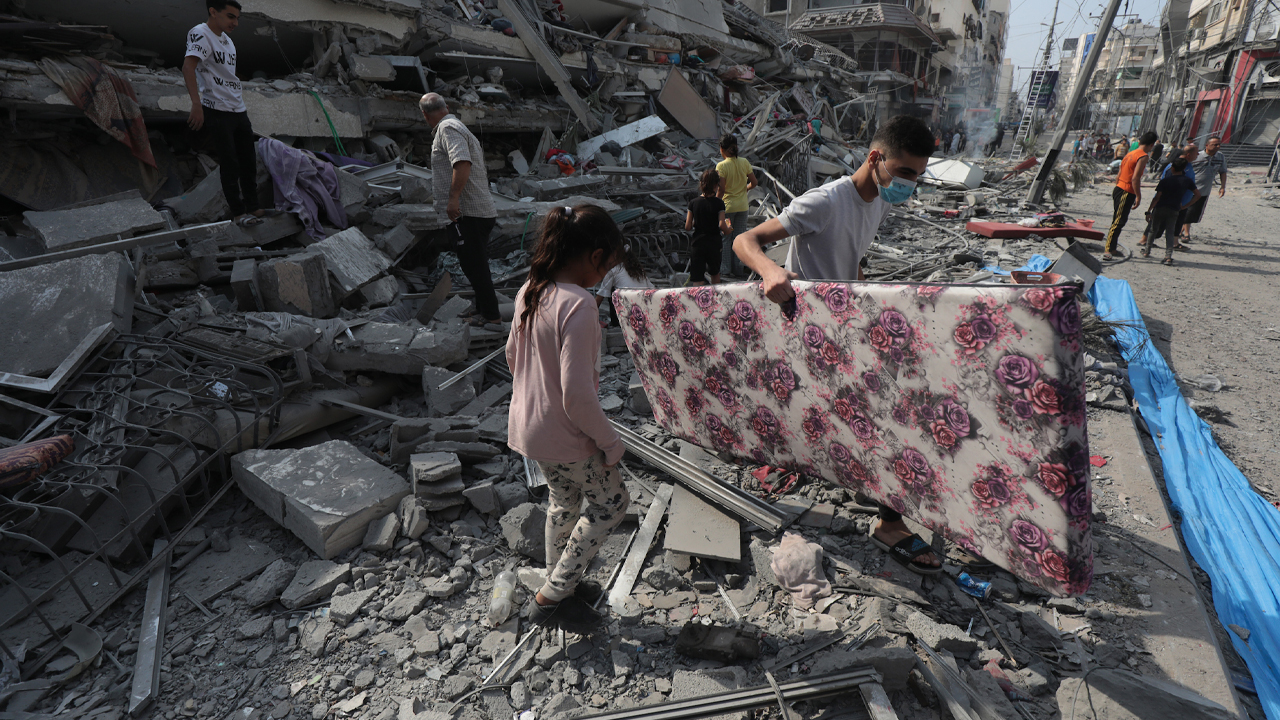‘They destroyed us’: North Gazans flee homes in search of food and shelter

Life is rapidly being choked out of northern Gaza. After enduring nearly five months of bombing, starvation, illness, pain and suffering, many of the last survivors have finally had enough, according to some of the displaced who have been speaking to UN News.
For months, the UN has been warning of a looming famine, particularly in northern Gaza as everything needed to sustain life has either been destroyed or simply run out. This is now being translated into deaths among children, not as a result of shells and bullets, but for lack of proper nutrition – or any nutrition at all.
The road to food and water“Everything that benefits the body, internally and externally, is not available in the north.” With these words, Abdullah Qarmout explained why he was forced to leave his home in the Jabalia refugee camp, where he had spent his whole life.
Tweet URL Signs of distress and exhaustion were visible on the 64-year-old man’s face when UN News met him west of Gaza City on Al Rachid Street, the main coastal road in the Strip. Along with several others, Abdullah and his wife, Aisha, decided to take the long and dangerous journey to the south in search of sustenance and safety.
“We have reached a point in which a loaf of barley that doesn’t even have three grams [of flour] costs one shekel, and a loaf with five grammes is for two shekels. I haven’t tasted a piece of bread or a drink of water since yesterday,” he said.
On Tuesday, a 14-truck aid convoy was turned back by the Israeli military after a three-hour wait at the Wadi Gaza checkpoint. This was the World Food Programme (WFP)’s first attempt to resume even small food deliveries to the north after being forced suspend its operations on 20 February due to the lack of safe humanitarian access.
The trucks were later stopped by a large crowd of desperate people who took around 200 tonnes of food aid, demonstrating in real life the alarm bells rung by the UN regarding law and order in what Secretary-General António Guterres called “a graveyard for children”.
‘There are a lot of good people; they will feed them’Aisha told UN News that she and Abdullah had convinced their son, Mohamed, to make the journey south along with his family of seven after exhausting all other options.
“I swear, his children were sleeping out of hunger. They didn’t have any food. He could not buy [diapers] and milk. I swear.”
UN News / Ziad Taleb Abdullah and Aisha Qarmout walking down Al Rachid Street on their way from northern Gaza to the south.The 62-year-old grandmother told UN News that the family was forced to borrow money from relatives and neighbours after depleting its own resources, but even that was no longer an option.
“We borrowed money to eat and drink. At the end, we would ask for loans, but people wouldn’t lend us anymore. We told our son: ‘My dear, the children are starving. They will die and their blood will be on your hands. Take them to the south; you will find food there. There are a lot of good people; they will feed them.
Khudur Al-Sultan told UN News that he and his family stood their ground for five months and refused to leave Jabalia City, despite the level of devastation it had endured. Their love of their hometown left them forced to eat animal feed and endure one of the worst humanitarian catastrophes in the world today.
“We were steadfast for five months. We tried to get food for our children, but where are we supposed to get food? The flour I bought lasted only one month. We started milling barley and fodder. Is this acceptable to God?”
Over 70 per cent of all housing units across the Gaza Strip have been destroyed, and that number climbs to over 80 per cent in the north.
An independent UN expert on housing, Balakrishnan Rajagopal, told the Human Rights Council that the scale and intensity of destruction in Gaza “is far worse than in Aleppo, Mariupol or even Dresden and Rotterdam during World War Two.”
“They destroyed us. They destroyed our lives and demolished our homes. My home is gone, for no reason. We are not wanted or anything like that, thank God. Why? What did we do?” Khudur asked.
The vulnerable lucky ones
These vulnerable Palestinians are actually the lucky ones. They still have the ability to move and attempt to seek some sort of refuge, a luxury that many of the estimated 300,000 people in northern Gaza simply do not have.
They have a long and treacherous journey ahead to an unknown fate. They continue their march on foot down to Rafah, where over 1.4 million people are living in abysmal conditions.
The coastal road they are using was witness to a tragic event just a few days ago, in which over 100 people were killed and several hundred others injured as they attempted to get flour to feed themselves and their families.
This incident alone is sufficient to understand the motives of these people to flee to a place where they know very well that the conditions are overcrowded, unhealthy and ultimately still very dangerous.
Ceasefire, now
The United Nations and all its agencies continue to call for an immediate humanitarian ceasefire in the Gaza Strip – as well as safe, unhindered and sustained humanitarian access – to save the remaining population and avert a major famine. It has also called for the immediate and unconditional release of all hostages held by Hamas and other Palestinian armed groups.
So far, these calls have fallen on deaf ears.
Visit UN News for more.










